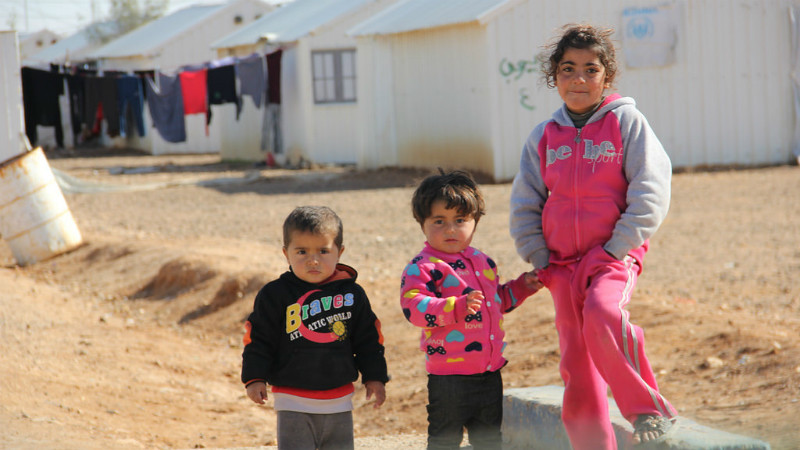Working with colleagues at Princess Sumaya University for Technology (Jordan), German Jordanian University (Jordan), and Mersin University (Turkey), the interdisciplinary team at Bath will aim to improve the living conditions in refugee camps by designing low-cost and easy to construct housing that will moderate extremes of temperature and ensure the privacy, comfort and dignity of residents.
The three-year project will conduct the largest ever global study investigating thermal, air quality and social conditions in camps housing displaced people. The views of camp occupants and aid agencies such as UNHCR (United Nations High Commissioner for Refugees) on the enhancement of housing and key social issues will be sought as a core element of this study.
Novel combinations of building materials
Aid agencies provide invaluable support and resources for large numbers of displaced people inside camps. However, according to a recent pilot study conducted by the research team, shelter design can create specific problems for inhabitants increasing, in turn, the demands upon humanitarian organisations. For example, health can be undermined when poorly-insulated shelters fail to mediate extremes of temperature and design that doesn’t meet the need for privacy and security can harm psychosocial wellbeing.
With these findings in view, the researchers will utilise building physics to inform the design of shelters using novel combinations of conventional and non-conventional materials to ensure the shelters naturally stay warm in winter and cool in summer.
20 possible shelter designs will be created, with six designs constructed in the UK to test construction times, and thermally tested in a climate chamber at the University’s Building Research Park in Swindon. The most promising of these designs will then be transported to Jordan to test in local conditions and obtain the feedback of camp occupants and aid agencies.
Extremely high levels of human displacement
The world is currently witnessing extremely high levels of human displacement with conflicts such as in Syria leading to the creation of a new generation of refugee camps. Whilst camps were originally seen as a short term solution, many across the world exist for years and even decades.
As well as Jordan, research will be conducted in refugee camps in three other countries selected to provide as wide a range of climatic, cultural, social and political conditions as possible. At present, the team envisage working in Thailand, Turkey and Tanzania.
The project will benefit aid agencies such as the UNHCR by creating a manual that explains the benefits of each shelter design, provides guidance on matching design with context, and offers guidelines on construction.
Pushing research boundaries
Lead investigator and Professor of Low Carbon Design at the University of Bath, David Coley, said: “In recognition of the immense variability in climatic, environmental and socio-cultural conditions, we aim to develop a variety of shelter designs suited to specific locales and the needs of those people who have been displaced.
“I visited Jordan in 2015 year during a rock climbing trip and fell in love with the country and the people. The extreme climates experienced by those living in refugee camps inspired me to propose this project which will truly push the boundaries of my research into low energy building design.”
Listen to David Coley talk more about the project.
Co-investigator and Senior Lecturer in the Anthropology of Development at the University of Bath, Dr Jason Hart, commented: “Over the last 20 years I have worked as an anthropologist with refugees in Jordan and the wider Middle East.
“I have witnessed firsthand the daily struggles of displaced people to lead dignified lives in difficult conditions, and decent housing can make an immense difference.
“I am therefore excited to collaborate with colleagues from the fields of architecture and civil engineering in a process of shelter design that meaningfully engages the views and aspirations of refugees themselves.”
Easing the suffering of refugees
Princess Sumaya University of Technology (PSUT) in Amman, Jordan collaborated with Bath in the pilot project and will play an important role as the team move to the next, expanded phase.
Professor Abdallah Al-Zoubi, Vice President of PSUT said: “It is an honour for us here at PSUT to collaborate with the prestigious University of Bath in this exciting humanitarian project to help refugees in Jordan, especially the Syrians.
“Our involvement in the project represents a tiny bit of the greater efforts Jordan is exerting in hosting the unfortunate children of Syria who are actually facing extreme conditions living in the desert.
“We hope that the results and outcomes of the project will ease the suffering of refugees and lead to a dignified stay in Jordan before their final short journey back home.”
The project, entitled ‘Healthy Housing for the Displaced’, has received £1.5 million funding from the Engineering and Physical Sciences Research Council (EPSRC).

